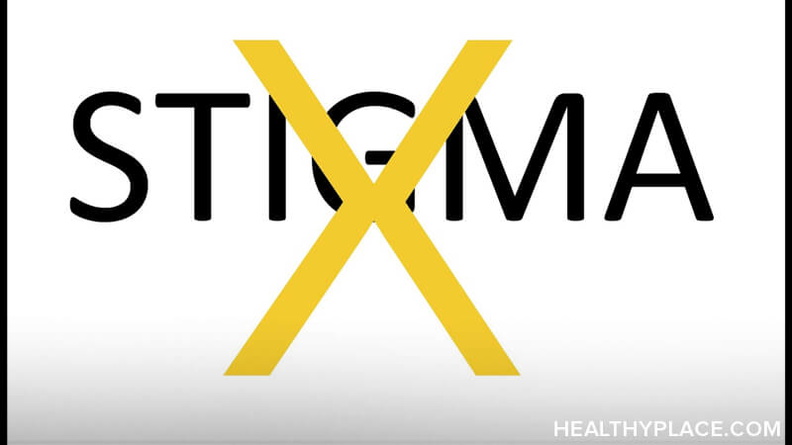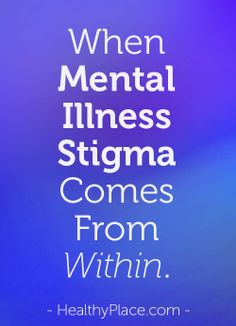Removing Self-Stigma from Mental Health Labels

Mental health labels can cause self-stigma, but they don't have to. An interesting realization came to me the other day. When I think about it now, it kind of seems self-evident, but it really struck me just how much of an issue it is. I’m talking about the self-stigma we feel when it comes to labels – whether the generalized “mental health” or “mental illness” label or more specific ones like depression or bipolar or whatever mental illness it is you deal with. But you can remove self-stigma from mental health labels.
Having a Mental Illness Does Not Mean You’re Unwell
It probably sounds like an oxymoron to even read that subheading, but let me explain.
The reason I decided to write this post is that I saw a post about someone who didn’t want to acknowledge her disorder as a mental illness. To me, it came across as she didn’t like the idea of being unwell.
This is how I look at mental illnesses: it just means we have an area of our brains that is unwell, not that we as a whole are unwell. It comes down to the idea that it’s okay to acknowledge our brains can get sick, too, and that there is nothing to be ashamed of when it comes to this reality.
All we’re doing by adding the label of a specific mental illness or of mental health, in general, is saying how our brains are sick, which then helps us with managing the issue and allows us to determine how we can properly treat it. The label also helps us connect with others who have been or are going through the same thing, which opens up the opportunity for a vast support network of people who get it.
Personally, I was once in the same boat as the person I mentioned earlier in my post. I felt weighed down by the label dermatillomania (formally called excoriation (skin picking) disorder) and didn’t want to be “sick.” A lot of it was because I was told it should be, and was, something bad in my life, so the name of the disorder added to the poison I already felt about myself because of what I was going through. Over time, though, I started to learn that just because an area of my brain is sick doesn’t mean I have to be sick or broken.
How to Remove the Self-Stigma from Mental Health Labels
 Understand a label is just saying how your brain is unwell. For instance, with dermatillomania, it is one area of my brain that isn’t well, but that doesn’t mean I am overall unwell as a person or incapable of life. More importantly, I don’t need to get down on myself because of something I have very little control over. Yes, I can manage my disorder, but it’s not something that I caused or am at fault for.
Understand a label is just saying how your brain is unwell. For instance, with dermatillomania, it is one area of my brain that isn’t well, but that doesn’t mean I am overall unwell as a person or incapable of life. More importantly, I don’t need to get down on myself because of something I have very little control over. Yes, I can manage my disorder, but it’s not something that I caused or am at fault for.
Don’t think of mental illnesses or mental health in a negative light. Think of them instead as descriptives. Think of them the same way you would describe yourself as a mother or a friend of a dog-owner or a painter. They’re just different ways to describe a small piece of yourself – to explain why you are the way you are.
Keep in mind too that the “wellness” is only gauged against a “normal” brain and what we deal with is just something different and perhaps more challenging than what a normal brain has to deal with. We aren’t defective and sickness doesn’t mean we’re irrevocably ruined.
We’ve got enough stigma coming from the outside. Let’s do what we can to get rid of the self-stigma, too.
You can find Laura on Twitter, Google+, Linkedin, Facebook and her blog; also see her book, Project Dermatillomania: The Stories Behind Our Scars.
APA Reference
Barton, L.
(2016, February 4). Removing Self-Stigma from Mental Health Labels, HealthyPlace. Retrieved
on 2025, November 27 from https://www.healthyplace.com/blogs/survivingmentalhealthstigma/2016/02/removing-self-stigma-from-mental-health-labels
Author: Laura A. Barton
Seems the word "mental" is unnecessary and redundant label. People can say cancer and relate, treat, and understand without additional labels. People can say depression, ADHD, anxiety and relate, treat, and understand without the word "mental" in front of illness or health. It only seems to create more stigma. Seems looking at the language used is worthy of discussion and thought. Stigma won't end by dropping the word "mental" but it may make it easier to walk into an office for help if it doesn't say "mental" health on the outside. Psychiatrist, psychotherapist, psychologist, seem as effective as dentist, oncologist, etc. My experience in healthcare is people don't want to have any illness regardless of where it originates in the body and it seems the word "mental" has just been an unnecessary negative. Of course don't want someone to have an additional self-stigma to the already societal stigma and again dropping the word "mental" will not
solve it but perhaps at least worthy of discussion.
Hi Jane,
I see where you're coming from and there definitely are a lot of negative connotations that come with the word mental, but I think instead of removing the word we need to remove the stigma from it. Prove that having a mental illness isn't a bad thing and that those of us who live with them are not "crazy." Language is definitely important and something that I pay particular attention to, however, I think we need to change how the language is perceived instead of removing it.
The best thing to do is just acknowledge it and try to lessen it with good psychology, good environmental stimuli, and being around good people. When someone loses a lot of money in the stock market, just start laughing and then you'll see their mental illness side too.
